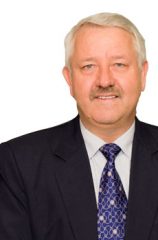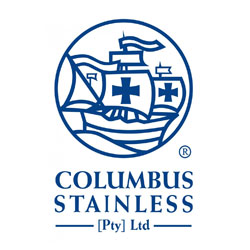In conversation with
Mr. Lucien Matthews
CEO | Columbus Stainless (Pty) Ltd

FDI Spotlight: What is the history and DNA of Columbus Stainless?
Lucien Matthews: Columbus Stainless started 50 years ago by Rand Mines, which began with producing an alloy called ferrochrome. Ferrochrome, also known as charge chrome and an essential ingredient in producing stainless and speciality steels, is big in Mpumalanga due to how coal-rich the area is and the abundance of Chrome ore in the region. The next logical step was to produce stainless steel through a company called Southern Cross Stainless, which is the origin of Columbus Stainless. In 1992 Anglo American, IDC and Gencore invested in South Africa’s stainless steel production, which was a big step for the sector, market and for the company. This joint venture was the start of the company known as Columbus Stainless.
By 2002 Acerinox, our Spanish owner was asked to become involved in Columbus Stainless; Acerinox are global leaders in the field and added significant value via efficiency, pricing, skills transfer and supporting us with understandings about the latest technology. They hold a 76% majority share in the company, with 24% held by the IDC (Industrial Development Corporation).
Acerinox‘s investment was a massive opportunity and benefit; we gained unique expertise, which allowed us to enter the stainless steel export market . They bought into the shareholding of Columbus Stainless Steel and invested in ensuring our facilities are state of the art. Technological enhancement and best practice are vital in being globally and regionally competitive. At first sight, our factory equipment may appear out-dated due to the age of the mechanical equipment. However, what sets us apart are the control programmes that drives this equipment. Our plant is an advanced, integrated, single-site operation, which gives us the flexibility to adjust to changes in the market. The Acerinox philosophy is to put a compact Stainless Steel Manufacturing unit into a specific market to better serve that market. This allows you to become part of the local and regional market you are investing and working in due to the amount of product you move into it.
Columbus Stainless is South Africa and Africa’s only producer of stainless steel flat products to manufacture items such as kitchen sinks, catalytic converters, pots and pans, kitchen equipment and food processing equipment. The potential for stainless steel as a metal for the future is infinite, which is why we are firm in our dedication to becoming one of the leading suppliers in our domestic market and global export markets.
We have created a modern, efficient stainless steel production facility flexible to the changing demands of users in the domestic market and around the world. With a wide range of products in Austenitic, Ferritic, Utility and Duplex grades produced in our Middelburg plant where we can offer a variety of stainless steel grades suitable for the majority of desired applications. Backed by sound technical support, we are also able to make recommendations on correct material selection as part of our customer support process.
Our exported products are channelled through a well-developed network of agents and group sales outlets operating in Europe, the Americas, the Middle East and the Far East. In addition, we trade directly to a number of end users and some re-roller customers.
South Africa is known for its skills gap in many industries, especially in mathematics and science. How do you manage these skills shortages when it comes to hiring new and especially young employees?
Lucien Matthews: The biggest problem we face is the continuous drain of quality expertise; the competition between similar companies, in South Africa, for scarce skills and us is high. The sector faces the challenge of gaining the correct people with the right skills and more experience base. We require diversified skill sets to fill the needs of the industry due to the competition being rather intense.
Because employees in this industry get poached often, we established a mandate for continuous development of skills for our employees, a few years ago, to keep them from getting lured elsewhere and also to train new staff, which can be a replacement, should we lose employees. We recognised and identified via a training needs analysis within South Africa, especially industries aligned with ours, and tailored our programmes for how we teach our people according to the specific requirements.
We increased our budget and expenditure for up-skilling measures and now take in and develop apprentices twice a year. We have two kinds of apprentices: (1) the steel makers, who run the equipment are being up-skilled to become the operators, process controllers and team managers; and (2) the artisans – people such as the electricians, boilermakers, riggers, millwrights, fitters, fitter and turners and instrumentation mechanicals.
We try as much as possible to focus on hiring local staff, which is very important for our economy. Unfortunately, we do sometimes struggle to get the required skill set or even individuals who must meet the minimum requirement, like having a decent level in metric focused on mathematics and science in our local community.
That said we get between 2000 and 3000 applicants annually. Unfortunately, there are only thirty positions to fill. The applicants are interviewed and take part in a field test so we know they can best understand the concept of controlling equipment from an MMI (man machine interface) For example; we have the applicants use the computers and iPads to control simple equipment so we can see whether they have the skills to use our complex computer controlled technology.
Once an applicant is accepted, they receive training within the required field. We want to make sure they get as many hands on experience and on the job education as possible. Once they qualify we often have open vacancies to take on the apprentices but if that is not possible, we help them gain employment elsewhere, so the associated industries are supported and the potential employee is guided so not to fall through the cracks.
I believe this is a proper and professionally run training programme. Our apprentices walk away with a hard and certified skill, national accreditation and exposed to expertise from working in an internationally competitive company because of our main shareholder Acerinox.
We also have a smaller pipeline for graduates where we offer training in engineering and other functional graduates and offering bursaries to students. This promises a continuous feed in skills for the business, as these students are usually absorbed into the company when they have completed their studies. These become tomorrow’s leaders of our business.
The culture within the company is well known for building up and expertly developing our people supported by recruiting internally instead of externally. Staff is rotated around the company’s business units. Once again having diversified staff that understand a wider range of the business is beneficial for our employee’s career path as well as enhancing the capabilities of the sector and Columbus Stainless Steel.
What would you say are the main trends and challenges of the current steel and stainless steel environment at a global level and within the African continent?
Lucien Matthews: We are all somewhat concerned, especially given how China has become a massive stainless steel provider. The problem is not that they are doing it, but it is affecting the global market because China is not focusing on the commodity for internal benefit of China only.
When China flooded the world with stainless steel, which is a niche sector, to begin with, Europe and America put up trade barriers quickly. This resulted in the Chinese moving into other countries such as South America, Russia, Asia and South East Asia. Columbus Stainless Steel competes with China within these markets.The weak Rand has been in our favour, but this cannot always protect you. When you compete with Chinese mills pricing is very important and it is also critical to look at how we deal and handle our market offering.
When the South African economy was downgraded and the Rand weakened, we could move larger amounts than usual. You have to stay competitive at both a local and global level, and part of that is looking at how much product you can move to penetrate the markets.
In South Africa transporting our goods on the roads to the ports can be expensive and we pay almost as much to get it to the ports as we transport it from our ports. We engage with Minister Dr Rob Davies of the Department of Trade and Industry (DTI) about costs and efficiencies of these services, and the competitiveness and access to ports and DTI have been helpful, open to discussions and suggestions for improvements.
Efficiency is key in SA industry and we keep the pressure on the system through talking with the DTI or other relevant Government Departments whilst we manage our own environment as best we can.
That said, I think there needs to be more affirmed action and less talking between Government and Private sector to improve the South African economic outlook. We have to look at what we can do with a firm eye on the potential for our economy and the industry to leverage our capabilities.
There is a definite disengagement between public and the private sector, and more often than not you need to find a department that works and appreciates the challenges and opportunities that exist if things are done efficiently and correctly.
I think sometimes it comes down to lack of experience; we have the expertise and many intelligent people in South Africa, however, I think there is a lack of experience for general office administration, implementation of projects or basic management principles. Only when we get this right in the private business environment and Government Departments will various sectors be enabled to prosper to their full extent.
How confidant are you that things will improve the current situation South Africa is in?
Lucien Matthews: I am confident. If you speak to international investors, you see that people are more confident than you think. The challenge is business often operates on perceptions rather than facts so we must ensure we send a message of a conducive business experience and offering to international investors.
The politics distract from the truth and the racial tensions being inflamed make it worse; however, what we see on the ground is and should be enough reason for people to be confident in the country’s future. Our biggest risks are the high unemployment figures, but we have more than enough reason to believe things will get better.
For Columbus Stainless Africa is the future, so we are very excited about its scope and economies of scale. The trade routes are well developed, and we are dynamic and flexible. This means that, as a company, we have reason to be excited about our future.
For the future, we are planning to increase the capacity of our factory and produce more, and increase efficiencies. We want to work more with the local government to increase local production. We are confident that through this we can help increase the number of foreign investors in South Africa.
